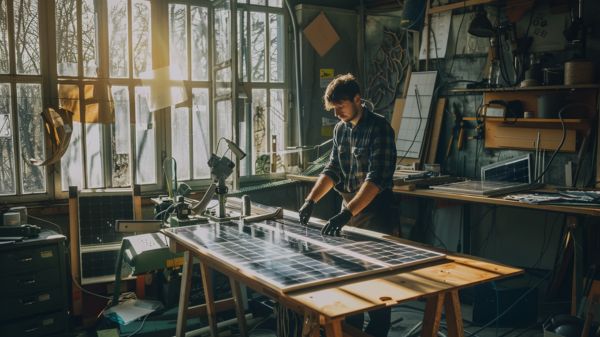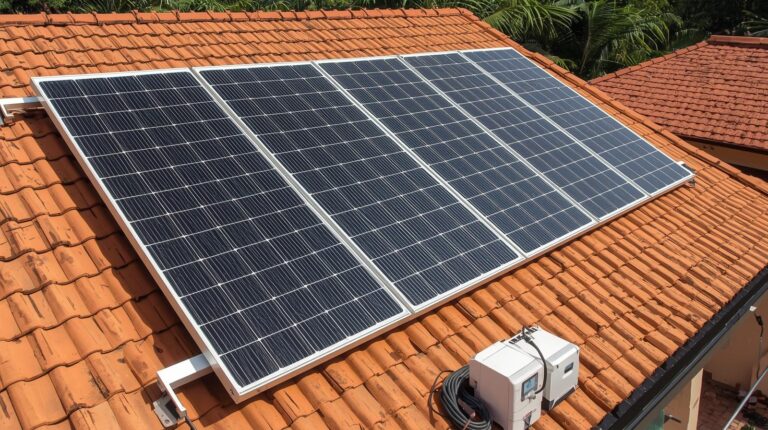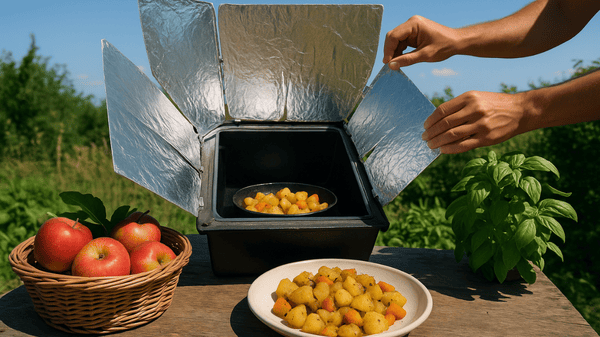You can legally make your own solar panels, but it’s important to adhere to local regulations and acquire necessary permits for a lawful installation. Key considerations include being aware of specific property laws, obeying building codes, understanding grid connection requirements, and verifying eligibility for energy credits or incentives.
Safety precautions are essential during DIY projects, encompassing fire and electrical safety, tool usage, personal protective equipment, and thorough project planning. Additionally, understanding the benefits, cost comparisons with professional installations, environmental impacts, maintenance needs, skill level requirements, and time commitments are crucial for a successful solar panel setup.
Key Takeaways
- Check local regulations and permits for DIY solar panel legality.
- Ensure compliance with zoning laws and safety inspections.
- Understand grid connection regulations and energy credit eligibility.
- Adhere to building codes and guidelines for solar panel installations.
- Research incentives and guidelines for legal DIY solar panel construction.
Legalities of DIY Solar Panels
When considering the legalities of DIY solar panels, it’s essential to be aware of local regulations and permits that may be required for installation. Solar energy regulations vary by region, so it’s crucial to research local incentives and guidelines to ensure compliance.
Permits and Regulations to Consider
Before you initiate your DIY solar panel project, it is crucial to understand the permits and regulations that may impact your installation process. When it comes to installing solar panels on your property, there are several key aspects you need to evaluate to guarantee everything is done correctly and legally.
Here are some important factors to keep in mind:
| Permits and Regulations | Description |
|---|---|
| Local Zoning | Check local zoning laws to see if there are any restrictions on solar panel installations in your area. |
| Safety Inspections | Some areas may require safety inspections before and after the installation to guarantee everything meets the necessary standards. |
| Grid Connection | Understand the regulations for connecting your solar panels to the grid and any requirements for net metering. |
| Energy Credits | Find out if you are eligible for any energy credits or incentives for installing solar panels. |
| Building Codes | Verify that your installation complies with all relevant building codes and regulations. |
Being aware of these factors and following the necessary guidelines, such as ensuring 100% solar charging for tax credit eligibility, will help you navigate the permit and regulatory requirements smoothly during your DIY solar panel project.
Safety Precautions for DIY Projects
Prior to beginning on any DIY project, guaranteeing your safety should be a top priority. When initiating making your own solar panels, it’s vital to follow safety precautions to prevent accidents and secure a successful project.
Here are some key safety measures to reflect on:
Fire Safety:
- Keep flammable materials away from your work area.
- Have a fire extinguisher nearby in case of emergencies.
Electrical Safety:
- Work on solar panels only in dry conditions.
- Use insulated tools to avoid electrical shocks.
- Ensure that the charge controller is properly connected to prevent electrical issues.
Tool Usage:
- Read and follow the manufacturer’s instructions for all tools.
- Wear appropriate safety gear, like goggles and gloves.
Personal Protective Equipment:
- Use a sturdy ladder when working at heights.
- Wear closed-toe shoes to protect your feet.
Project Planning:
- Conduct a thorough risk assessment before starting.
- Plan your project to minimize potential hazards.
Benefits of Making Your Own Panels
When you decide to make your own solar panels, you open up a world of benefits. To begin with, there’s the potential for significant cost savings compared to purchasing pre-made panels. Additionally, you have the freedom to customize the design to fit your specific energy needs, aesthetic preferences, and scalability potential.
Cost Savings Potential
If you’re considering making your own solar panels, one of the key benefits to keep in mind is the significant cost savings potential. By choosing your own material selection wisely and focusing on energy efficiency, you can save a substantial amount of money in the long run.
Here are some ways in which making your own solar panels can lead to cost savings:
- Material Selection: By carefully choosing the materials for your solar panels, you can control costs and guarantee that you’re getting the best value for your money.
- Energy Efficiency: When you make your own solar panels, you have the opportunity to optimize their energy efficiency, leading to higher electricity production and lower utility bills.
- Reduced Installation Costs: Making your own solar panels can also reduce installation costs, as you can choose to install them yourself or find more affordable installation services.
Customized Design Options
Considering the potential cost savings of making your own solar panels, another significant benefit lies in the customized design options available to you.
With design flexibility, you have the freedom to create solar panels that align perfectly with your aesthetic preferences and the architectural style of your home. This customization allows you to integrate the solar panels seamlessly into your property, enhancing both the visual appeal and functionality of your energy system.
You can choose the size, shape, and color of the panels to suit your specific needs and complement the overall look of your residence. By taking control of the design process, you can guarantee that your solar panels not only generate clean energy but also enhance the beauty of your property.
Embrace the opportunity for aesthetic customization and design your solar panels to reflect your unique style and personality while harnessing the power of the sun to meet your energy needs.
Learning Practical Skills
By making your own solar panels, you can acquire valuable practical skills that go beyond just generating clean energy. The hands-on experience of assembling solar panels provides you with a deep understanding of how they work and the components involved. This practical knowledge can be applied to various real-world scenarios, giving you the ability to troubleshoot and maintain solar energy systems effectively.
Learning to make your own solar panels also equips you with skills in practical applications such as soldering, wiring, and basic electronics. These skills aren’t only beneficial for solar panel construction but can also be transferred to other DIY projects or even potential career paths in the renewable energy industry.
Additionally, the experience of building solar panels from scratch fosters creativity and problem-solving abilities, as you navigate through the intricacies of the process. Embrace the opportunity to expand your skill set and gain a deeper appreciation for sustainable energy solutions through the practical hands-on experience of making your own solar panels.
⚡ Stay Powered When the Grid Goes Down
What if you could keep lights, devices, and even critical systems running during any blackout? That’s exactly what Dark Reset shows you how to do—using simple, proven methods. Discover lots of ways to prepare for energy independence.
Cost Comparison: DIY vs. Professional Installation
When comparing the cost of making your own solar panels versus professional installation, it’s vital to take into account the financial aspects, skill level required, and time commitment involved. Understanding the cost-effectiveness of each option will help you make an informed decision on which route to take.
Additionally, evaluating the skills you possess and the time you can dedicate to the project will play an essential role in determining the most suitable choice for your solar panel installation. Proper site location assessment is crucial for maximizing solar panel efficiency and energy production.
Cost-effectiveness DIY vs. Pro
For those contemplating the installation of solar panels, a critical consideration is the cost-effectiveness of a do-it-yourself (DIY) approach versus hiring professionals for the job. When conducting a budget analysis, it’s crucial to factor in various aspects to make an informed decision:
DIY Approach:
- Material Sourcing: Procuring solar panel components yourself can potentially reduce costs.
- Labor Costs: Savings can be significant by investing your time and effort into the installation process.
- Challenges: DIY projects may require more time and expertise, impacting the overall cost-effectiveness.
Professional Installation:
- Expertise: Professionals bring experience and knowledge to guarantee efficient installation.
- Warranty: Installation by professionals often comes with warranties, providing peace of mind.
- Speed: Professional installers can complete the job faster, minimizing disruptions.
Consider your budget, available time, and comfort level with the installation process to determine whether a DIY approach or professional installation is more cost-effective for your solar panel project.
Skill Level Required
To determine the skill level required for installing solar panels, consider both the DIY and professional installation options. When it comes to making your own solar panels, the skill level needed varies depending on your comfort with basic materials and assembly techniques.
Here are some key points to keep in mind:
- DIY solar panel assembly requires a moderate level of technical skill.
- Understanding basic electrical concepts is beneficial for a successful DIY solar panel project.
- Familiarity with tools such as drills, soldering irons, and wire cutters is necessary.
Professional installation typically involves a higher level of expertise and training. Professionals have experience in complex wiring, roof mounting, and system integration.
Whether you choose the DIY route or opt for professional installation, ensuring that you have the necessary skills and knowledge will result in a successful solar panel setup.
Time Commitment Needed
Taking into account the time commitment needed for installing solar panels, it’s vital to weigh the cost comparison between DIY and professional installation. When starting on a solar panel project, time management plays an important role in determining whether you opt for a DIY approach or hire professionals.
Here’s what you need to evaluate regarding the time commitment:
DIY Installation:
- DIY projects often require more time due to the need for research, learning, and hands-on work.
- Project planning is essential to guarantee you allocate enough time for each step, from acquiring materials to installation.
- You’ll need to dedicate weekends or evenings to complete the project, potentially extending the timeline based on your availability and skill level.
Professional Installation:
- Professionals have the expertise to streamline the installation process, greatly reducing the time needed.
- With professional installation, project planning and execution are handled by experienced individuals, leading to quicker completion.
- While it may cost more upfront, the time saved can be valuable, especially if time management is a concern for you.
When weighing the time commitment needed for solar panel installation, evaluate your availability, skill level, and project planning capabilities to make an informed decision between DIY and professional installation.
Environmental Impact of DIY Solar Panels
With the increasing popularity of DIY solar panels, it’s crucial to contemplate the environmental impact of initiating such a project. When considering the environmental impact of DIY solar panels, you can expect the following:
- Reduction in Carbon Footprint: By generating your own clean energy, you contribute to reducing greenhouse gas emissions, thereby lowering your carbon footprint.
- Promotion of Renewable Energy: DIY solar panels encourage the use of renewable energy sources, promoting sustainability and environmental benefits.
- Decreased Reliance on Fossil Fuels: Embracing solar power enhances energy independence by reducing dependence on non-renewable fossil fuels.
- Minimal Land Use Impact: Compared to large-scale solar farms, DIY panels require less land use, minimizing disruption to ecosystems.
- Long-Term Environmental Benefits: The long lifespan of solar panels guarantees prolonged environmental benefits, making them a sustainable choice for energy production.
Maintenance and Warranty Considerations
As you commence your DIY solar panel project, it’s vital to factor in maintenance and warranty considerations. Proper maintenance is imperative to guarantee the longevity and efficiency of your solar panels.
Here are some maintenance tips to keep in mind:
- Regularly clean your solar panels to remove dust, debris, and any shading obstructions to maximize sunlight absorption.
- Check for any signs of damage, such as cracks or water ingress, and address them promptly to prevent further issues.
- Monitor the performance of your solar panels periodically to make sure they’re producing the expected amount of energy.
Additionally, when making your own solar panels, be aware of the warranty coverage provided by the components you use.
Different components may have varying warranty terms, so it’s important to understand what’s covered and for how long. This knowledge can help you address any potential issues that may arise in the future.
Resources for DIY Solar Panel Guides
To commence your DIY solar panel project successfully, having access to reliable resources and guides is essential. When looking for resources to guide you through the process of making your own solar panels, consider the following:
- Online tutorials: Websites like YouTube and Instructables offer step-by-step videos and instructions on how to gather solar panel materials and assemble them using various techniques.
- DIY solar panel kits: These kits come with all the necessary components and detailed instructions to help you assemble your solar panels efficiently.
- Solar energy forums: Joining online forums dedicated to solar energy enthusiasts can provide valuable insights, tips, and recommendations for DIY solar panel projects.
- Local workshops: Some community centers or educational institutions offer workshops on solar panel assembly techniques, allowing you to learn hands-on skills from experts.
- Renewable energy books: Investing in books that focus on solar panel construction can serve as thorough guides for your DIY project.
- When exploring resources, also consider consulting with experienced solar panel installers for practical advice and best practices in DIY solar panel construction.
Conclusion
In summary, while you are technically allowed to make your own solar panels, there are important legalities, regulations, and safety precautions to take into account. DIY projects can offer cost savings and environmental benefits, but professional installation may provide peace of mind and warranty protection.
Ultimately, the decision to make your own panels should be carefully weighed against these factors to guarantee a successful and safe outcome. Think about all aspects before starting a DIY solar panel project.
⚡ Stay Powered When the Grid Goes Down
What if you could keep lights, devices, and even critical systems running during any blackout? That’s exactly what Dark Reset shows you how to do—using simple, proven methods. Discover lots of ways to prepare for energy independence.




